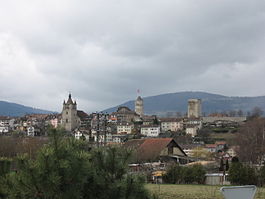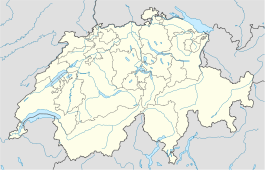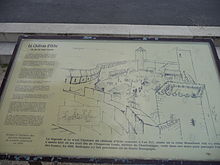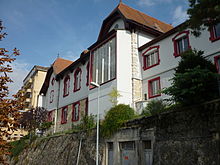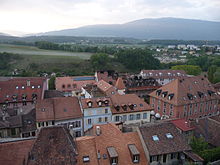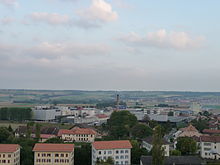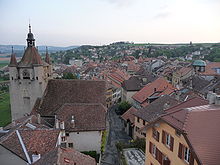- Orbe
-
Orbe Orbe town Country Switzerland 
Canton Vaud District Jura-Nord Vaudois 46°43′N 06°32′E / 46.717°N 6.533°ECoordinates: 46°43′N 06°32′E / 46.717°N 6.533°E Population 5,965 (Dec 2009)[1] - Density 495 /km2 (1,283 /sq mi) Area 12.04 km2 (4.65 sq mi) Elevation 479 m (1,572 ft) Postal code 1350 SFOS number 5757 Surrounded by Agiez, Arnex-sur-Orbe, Chavornay, Ependes, Essert-Pittet, Mathod, Montcherand, Valeyres-sous-Rances Website www.orbe.ch
Profile, SFSO statisticsView map of Orbe Orbe (Latin: Urba; German: Orbach) is a municipality in the Swiss canton of Vaud. It was the seat of the former district of Orbe and is now part of the district of Jura-Nord Vaudois.
Contents
History
Orbe is first mentioned about 280 as Urba. In 1179 it was mentioned as versus Orbam.[2]
Ancient history
During the Roman era, Orbe - then known as Urba - was a town of Gallia, in the territory of the Helvetii. In the Antonine Itinerary it is placed between Lacus Lausonius and Ariolica, xviii m.p. from Lacus Lausonius and xxiiii m.p. from Ariolica. On the Boscéaz hill, a Roman villa was built by an unknown landowner. The mosaics of the villa are still visible.
=Middle ages
Orbe is located on the route to the Jougne Pass and at the intersection of important roads that connected the Jura Mountains to the Alps and the Rhine and Rhone river. Its location made Orbe into an important transit point. During the Middle Ages a bridge was built across the Orbe river. On the left bank were the villa Tavellis and the parish church of Saint-Germain, while on the right bank was the villa Tabernis with the church of Saint-Martin. The castle and market were built on the hill above the river and the bridge. In 888 the town was owned by Rudolf I of Burgundy. The town's mint produced silver coins for Conrad the peaceful (937-993). After the death of the last Rudolf in 1032, the area was incorporated into the Holy Roman Empire. In 1076 all the ties to the Kingdom of Burgundy in Orbe were severed by Emperor Henry IV and Count Wilhelm II. In 1168, about half of the town of Orbe came under Amadeus II of Montfaucon, the count of Montbéliard. The churches and a large part of Orbe were owned by the monastery at Baulmes and Payerne Priory in 1183.[2]
At the end of the 11th Century, Romainmôtier Abbey built a hospital (first mentioned in 1275) in Orbe. In 1139, the Abbey acquired the adjoining chapel of Notre-Dame. Amadeus III of Montfaucon-Montbeliard fortified the town in 1235 with the construction of the Bourg-Vieux and Bourg-Neuf. In 1233 a round keep was mentioned in the castle. The fortifications allowed Orbe to control the road that led to Les Clées and the Jura Mountains in one direction and to Lausanne in the other. Together with Echallens, Orbe formed a burgund enclave in the midst of the Savoy lands and the diocese of Lausanne.[2]
Early Modern and Modern Orbe
Girard de Montfaucon granted Orbe the same rights as city of Moudon, a decision which was upheld by his widow Jaquette of Grandson in 1352. By inheritance, the town went to Count Montbeliard in 1379, then to Louis de Chalon, Prince of Orange in 1410. It was captured for the first time by the Swiss Confederation in 1475 and then quickly recovered by Hugh of Chalon. In the following year, 1476, Charles the Bold met with Swiss messengers at Orbe. After the Burgundian Wars, the lands of the house of Chalon on the Swiss side of the Jura mountains were administered by Bern and Freiburg. Orbe, together with Echallens, were managed as a gemeine Herrschaft or shared subject territory by from 1484 until 1798. In 1798 a majority of the urban population supported the Helvetic Revolution despite the opposition of the nobles. During the Stecklikrieg, when the government of the Helvetic Republic retreated to Lausanne, following their capitulation, Orbe was briefly occupied by Federal troops in September 1802. Between 1798 and 2006, Orbe was the capital of a district of the same name.[2]
Geography
Orbe has an area, as of 2009[update], of 12 square kilometers (4.6 sq mi). Of this area, 8.85 km2 (3.42 sq mi) or 73.6% is used for agricultural purposes, while 0.44 km2 (0.17 sq mi) or 3.7% is forested. Of the rest of the land, 2.36 km2 (0.91 sq mi) or 19.6% is settled (buildings or roads), 0.35 km2 (0.14 sq mi) or 2.9% is either rivers or lakes.[3]
Of the built up area, industrial buildings made up 3.0% of the total area while housing and buildings made up 8.7% and transportation infrastructure made up 5.7%. while parks, green belts and sports fields made up 1.7%. Out of the forested land, 2.2% of the total land area is heavily forested and 1.4% is covered with orchards or small clusters of trees. Of the agricultural land, 60.7% is used for growing crops and 9.2% is pastures, while 3.7% is used for orchards or vine crops. All the water in the municipality is flowing water.[3]
The municipality was the capital of the Orbe District until it was dissolved on 31 August 2006, and Orbe became part of the new district of Jura-Nord Vaudois.[4]
The municipality is located on a hill partly surrounded by the Orbe river. It consists of the village of Orbe and a number of hamlets including Granges Saint-Germain, Granges Saint-Martin, Mont Choisi and Le Puisoir.
Coat of arms
The blazon of the municipal coat of arms is Gules, two Sea-daces addorsed Or.[5]
Demographics
Orbe has a population (as of December 2009[update]) of 5,965.[1] As of 2008[update], 28.6% of the population are resident foreign nationals.[6] Over the last 10 years (1999–2009 ) the population has changed at a rate of 25.8%. It has changed at a rate of 22.1% due to migration and at a rate of 4.3% due to births and deaths.[7]
Most of the population (as of 2000[update]) speaks French (4,229 or 82.3%), with Portuguese being second most common (255 or 5.0%) and German being third (161 or 3.1%). There are 128 people who speak Italian and 4 people who speak Romansh.[8]
The age distribution, as of 2009[update], in Orbe is; 674 children or 11.3% of the population are between 0 and 9 years old and 781 teenagers or 13.1% are between 10 and 19. Of the adult population, 862 people or 14.5% of the population are between 20 and 29 years old. 848 people or 14.2% are between 30 and 39, 920 people or 15.4% are between 40 and 49, and 754 people or 12.7% are between 50 and 59. The senior population distribution is 493 people or 8.3% of the population are between 60 and 69 years old, 378 people or 6.3% are between 70 and 79, there are 216 people or 3.6% who are between 80 and 89, and there are 31 people or 0.5% who are 90 and older.[9]
As of 2000[update], there were 2,103 people who were single and never married in the municipality. There were 2,441 married individuals, 304 widows or widowers and 291 individuals who are divorced.[8]
As of 2000[update] the average number of residents per living room was 0.63 which is about equal to the cantonal average of 0.61 per room.[7] In this case, a room is defined as space of a housing unit of at least 4 m² (43 sq ft) as normal bedrooms, dining rooms, living rooms, kitchens and habitable cellars and attics.[10] About 31.4% of the total households were owner occupied, or in other words did not pay rent (though they may have a mortgage or a rent-to-own agreement).[11]
As of 2000[update], there were 2,073 private households in the municipality, and an average of 2.3 persons per household.[7] There were 687 households that consist of only one person and 120 households with five or more people. Out of a total of 2,108 households that answered this question, 32.6% were households made up of just one person and there were 16 adults who lived with their parents. Of the rest of the households, there are 578 married couples without children, 642 married couples with children There were 120 single parents with a child or children. There were 30 households that were made up of unrelated people and 35 households that were made up of some sort of institution or another collective housing.[8]
In 2000[update] there were 529 single family homes (or 54.6% of the total) out of a total of 968 inhabited buildings. There were 222 multi-family buildings (22.9%), along with 154 multi-purpose buildings that were mostly used for housing (15.9%) and 63 other use buildings (commercial or industrial) that also had some housing (6.5%).[12]
In 2000[update], a total of 1,934 apartments (84.7% of the total) were permanently occupied, while 208 apartments (9.1%) were seasonally occupied and 141 apartments (6.2%) were empty.[12] As of 2009[update], the construction rate of new housing units was 5.4 new units per 1000 residents.[7] The vacancy rate for the municipality, in 2010[update], was 0.18%.[7]
The historical population is given in the following chart:[2][13]

Heritage sites of national significance
The Boscéaz (a gallo-roman villa), Orbe Castle with its two towers and plaza, the Swiss Reformed Church of Notre-Dame and the City Hall are listed as Swiss heritage site of national significance. The entire old town of Orbe is part of the Inventory of Swiss Heritage Sites.[14]
The villa is known for its roman mosaics, which are composed of several hundreds of pieces on the floor of the original site. The villa was a palace belonging to a rich but unknown landowner. It was built in approximately AD 160 and abandoned around the year AD 270.
Sights
Orbe also includes a marionette museum
Politics
In the 2007 federal election the most popular party was the SP which received 26.68% of the vote. The next three most popular parties were the SVP (20.26%), the FDP (14.52%) and the Green Party (12.92%). In the federal election, a total of 1,107 votes were cast, and the voter turnout was 36.2%.[15]
Economy
The town has a Nestle Research & Development factory with a working force of over 500 employees. The factory is responsible for producing Nespresso and also Nestlé's boxed cereals. The factory accounts for just over 15% of Nestlé's overall turnover per annum.
As of 2010[update], Orbe had an unemployment rate of 7.5%. As of 2008[update], there were 95 people employed in the primary economic sector and about 18 businesses involved in this sector. 1,121 people were employed in the secondary sector and there were 48 businesses in this sector. 2,173 people were employed in the tertiary sector, with 227 businesses in this sector.[7] There were 2,624 residents of the municipality who were employed in some capacity, of which females made up 38.5% of the workforce.
In 2008[update] the total number of full-time equivalent jobs was 2,996. The number of jobs in the primary sector was 85, all of which were in agriculture. The number of jobs in the secondary sector was 1,081 of which 807 or (74.7%) were in manufacturing and 241 (22.3%) were in construction. The number of jobs in the tertiary sector was 1,830. In the tertiary sector; 343 or 18.7% were in the sale or repair of motor vehicles, 82 or 4.5% were in the movement and storage of goods, 58 or 3.2% were in a hotel or restaurant, 15 or 0.8% were in the information industry, 36 or 2.0% were the insurance or financial industry, 515 or 28.1% were technical professionals or scientists, 121 or 6.6% were in education and 257 or 14.0% were in health care.[16]
In 2000[update], there were 1,832 workers who commuted into the municipality and 1,489 workers who commuted away. The municipality is a net importer of workers, with about 1.2 workers entering the municipality for every one leaving. About 7.1% of the workforce coming into Orbe are coming from outside Switzerland.[17] Of the working population, 10.6% used public transportation to get to work, and 66.2% used a private car.[7]
Religion
From the 2000 census[update], 1,774 or 34.5% were Roman Catholic, while 1,993 or 38.8% belonged to the Swiss Reformed Church. Of the rest of the population, there were 70 members of an Orthodox church (or about 1.36% of the population), there were 3 individuals (or about 0.06% of the population) who belonged to the Christian Catholic Church, and there were 342 individuals (or about 6.65% of the population) who belonged to another Christian church. There were 7 individuals (or about 0.14% of the population) who were Jewish, and 201 (or about 3.91% of the population) who were Islamic. There were 10 individuals who were Buddhist, 14 individuals who were Hindu and 10 individuals who belonged to another church. 620 (or about 12.06% of the population) belonged to no church, are agnostic or atheist, and 260 individuals (or about 5.06% of the population) did not answer the question.[8]
Education
In Orbe about 1,774 or (34.5%) of the population have completed non-mandatory upper secondary education, and 433 or (8.4%) have completed additional higher education (either university or a Fachhochschule). Of the 433 who completed tertiary schooling, 56.1% were Swiss men, 25.9% were Swiss women, 11.3% were non-Swiss men and 6.7% were non-Swiss women.[8]
In the 2009/2010 school year there were a total of 802 students in the Orbe school district. In the Vaud cantonal school system, two years of non-obligatory pre-school are provided by the political districts.[18] During the school year, the political district provided pre-school care for a total of 578 children of which 359 children (62.1%) received subsidized pre-school care. The canton's primary school program requires students to attend for four years. There were 427 students in the municipal primary school program. The obligatory lower secondary school program lasts for six years and there were 368 students in those schools. There were also 7 students who were home schooled or attended another non-traditional school.[19]
Orbe is home to 1 museum, the Fondation Pro Urba. In 2009 it was visited by 2,900 visitors (the average in previous years was 3,278).[20]
As of 2000[update], there were 322 students in Orbe who came from another municipality, while 219 residents attended schools outside the municipality.[17]
References
- ^ a b Swiss Federal Statistical Office, MS Excel document – Bilanz der ständigen Wohnbevölkerung nach Kantonen, Bezirken und Gemeinden (German) accessed 25 August 2010
- ^ a b c d e Orbe in German, French and Italian in the online Historical Dictionary of Switzerland.
- ^ a b Swiss Federal Statistical Office-Land Use Statistics 2009 data (German) accessed 25 March 2010
- ^ Nomenklaturen – Amtliches Gemeindeverzeichnis der Schweiz (German) accessed 4 April 2011
- ^ Flags of the World.com accessed 29-July-2011
- ^ Swiss Federal Statistical Office - Superweb database - Gemeinde Statistics 1981-2008 (German) accessed 19 June 2010
- ^ a b c d e f g Swiss Federal Statistical Office accessed 29-July-2011
- ^ a b c d e STAT-TAB Datenwürfel für Thema 40.3 - 2000 (German) accessed 2 February 2011
- ^ Canton of Vaud Statistical Office (French) accessed 29 April 2011
- ^ Eurostat. "Housing (SA1)" (pdf). Urban Audit Glossary. 2007. p. 18. http://www.bfs.admin.ch/bfs/portal/en/index/international/22/lexi.Document.116365.pdf. Retrieved 12 February 2010.
- ^ Urban Audit Glossary pg 17
- ^ a b Swiss Federal Statistical Office STAT-TAB - Datenwürfel für Thema 09.2 - Gebäude und Wohnungen (German) accessed 28 January 2011
- ^ Swiss Federal Statistical Office STAT-TAB Bevölkerungsentwicklung nach Region, 1850-2000 (German) accessed 29 January 2011
- ^ "Kantonsliste A-Objekte" (in German). KGS Inventar. Federal Office of Civil Protection. 2009. http://www.bevoelkerungsschutz.admin.ch/internet/bs/de/home/themen/kgs/kgs_inventar/a-objekte.html. Retrieved 25 April 2011.
- ^ Swiss Federal Statistical Office, Nationalratswahlen 2007: Stärke der Parteien und Wahlbeteiligung, nach Gemeinden/Bezirk/Canton (German) accessed 28 May 2010
- ^ Swiss Federal Statistical Office STAT-TAB Betriebszählung: Arbeitsstätten nach Gemeinde und NOGA 2008 (Abschnitte), Sektoren 1-3 (German) accessed 28 January 2011
- ^ a b Swiss Federal Statistical Office - Statweb (German) accessed 24 June 2010
- ^ Organigramme de l'école vaudoise, année scolaire 2009-2010 (French) accessed 2 May 2011
- ^ Canton of Vaud Statistical Office - Scol. obligatoire/filières de transition (French) accessed 2 May 2011
- ^ Canton of Vaud Statistical Office - Fréquentation de quelques musées et fondations, Vaud, 2001-2009 (French) accessed 2 May 2011
 This article incorporates text from a publication now in the public domain: Smith, William, ed (1854–57). "article name needed". Dictionary of Greek and Roman Geography. London: John Murray.
This article incorporates text from a publication now in the public domain: Smith, William, ed (1854–57). "article name needed". Dictionary of Greek and Roman Geography. London: John Murray.
External links
- Official website
- Switzerland Tourism information
- Boscéaz in German, French and Italian in the online Historical Dictionary of Switzerland.
- Orbe district in German, French and Italian in the online Historical Dictionary of Switzerland.
Categories:- Municipalities of the canton of Vaud
- Municipalities of Switzerland
- Roman towns and cities in Switzerland
- Cities in Switzerland
- Former condominiums of Switzerland
- Helvetii
- Cultural property of national significance in the canton of Vaud
Wikimedia Foundation. 2010.

